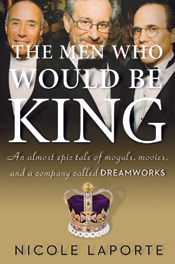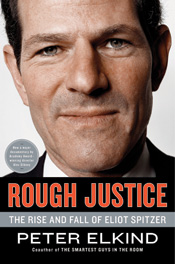|
|
 |

by Jason Allen Ashlock
|
Nicole LaPorte The Men Who Would Be King: An Almost Epic Tale of Moguls, Movies, and a Company Called Dreamworks (Houghton Mifflin Harcourt).
 When word trickled across Wilshire Avenue and down the Avenue of the Stars that Nicole LaPorte was writing a book on the dream/delusion that was Dreamworks, the response was generally of the “she’ll never eat lunch in this town again” variety. LaPorte certainly faced her share of slammed doors, sudden dial tones, and icy stares in her pursuit of the untold story behind the too-good-to-be-true triptych of Steven Spielberg, David Geffen and Jeff Katzenberg. A former Variety editor and current Daily Beast contributor, LaPorte is accustomed to the work of illuminating the hidden grit behind Hollywood gold, and here she offers a work that could not be more fitted for the audience it hopes to attract. With mural-sized character portraits of agents, actors, and acolytes, a seemingly Google-sized archive of industry secrets, and a delightfully dramatic narrative delivery, The Men Who Would Be King is a true myth: a story so big and theatrical it could only have been lived by the men who run the world. LaPorte is a Tinseltown trobairitz—she knows exactly when to draw out the drama, when to shift the scene, and when to hit the punch line. And she knows a Hollywood tale can only be told with Hollywood flare: the behind-the-scenes Dreamworks drama is described as “high concept”; major character appearances are stage-directed (“Enter Geffen”); and scenes are described with a balance of detail and expansiveness akin to a cinematographer’s notes. Dreamworks has dissipated, but thanks to LaPorte, the bigger-than-you egos who created it and the bigger-than-life legend they left behind remain. If once upon a time the big three all refused to be interviewed for the book, after they read LaPorte’s bigscreen Baedeker, one of them should take her to lunch. When word trickled across Wilshire Avenue and down the Avenue of the Stars that Nicole LaPorte was writing a book on the dream/delusion that was Dreamworks, the response was generally of the “she’ll never eat lunch in this town again” variety. LaPorte certainly faced her share of slammed doors, sudden dial tones, and icy stares in her pursuit of the untold story behind the too-good-to-be-true triptych of Steven Spielberg, David Geffen and Jeff Katzenberg. A former Variety editor and current Daily Beast contributor, LaPorte is accustomed to the work of illuminating the hidden grit behind Hollywood gold, and here she offers a work that could not be more fitted for the audience it hopes to attract. With mural-sized character portraits of agents, actors, and acolytes, a seemingly Google-sized archive of industry secrets, and a delightfully dramatic narrative delivery, The Men Who Would Be King is a true myth: a story so big and theatrical it could only have been lived by the men who run the world. LaPorte is a Tinseltown trobairitz—she knows exactly when to draw out the drama, when to shift the scene, and when to hit the punch line. And she knows a Hollywood tale can only be told with Hollywood flare: the behind-the-scenes Dreamworks drama is described as “high concept”; major character appearances are stage-directed (“Enter Geffen”); and scenes are described with a balance of detail and expansiveness akin to a cinematographer’s notes. Dreamworks has dissipated, but thanks to LaPorte, the bigger-than-you egos who created it and the bigger-than-life legend they left behind remain. If once upon a time the big three all refused to be interviewed for the book, after they read LaPorte’s bigscreen Baedeker, one of them should take her to lunch.
Jonathan Tisch Citizen You: Doing Your Part to Change the World (Crown).
 This fall may bring Michael Douglas the chance to revisit his role as Gordon Gekko, but the “Greed is Good” world that died with Ponzi schemes and derivative scams is not in line for a sequel. Jonathan Tisch, long-time corporate good guy and for twenty years the CEO of Loews Hotels, believes we’ve had enough of anti-heroes; a post-crash America needs as many heroes as it can get, and you need look no farther than yourself to find one. Rescuing the concept of activism from outdated forms of collective movement, Tisch suggests that the creativity, interconnectedness, and global awareness of our moment offer new opportunities to challenge what’s wrong and introduce what’s right. In keeping with his ethos, Tisch shines the spotlight on a stage full of social entrepreneurs, gathering cures for our troubled times from a variety of sources. His stories are inspiring, but his advice is clear: cynicism is a frivolity these exigent times cannot endure. This fall may bring Michael Douglas the chance to revisit his role as Gordon Gekko, but the “Greed is Good” world that died with Ponzi schemes and derivative scams is not in line for a sequel. Jonathan Tisch, long-time corporate good guy and for twenty years the CEO of Loews Hotels, believes we’ve had enough of anti-heroes; a post-crash America needs as many heroes as it can get, and you need look no farther than yourself to find one. Rescuing the concept of activism from outdated forms of collective movement, Tisch suggests that the creativity, interconnectedness, and global awareness of our moment offer new opportunities to challenge what’s wrong and introduce what’s right. In keeping with his ethos, Tisch shines the spotlight on a stage full of social entrepreneurs, gathering cures for our troubled times from a variety of sources. His stories are inspiring, but his advice is clear: cynicism is a frivolity these exigent times cannot endure.
Peter Elkind Rough Justice: The Rise and Fall of Eliot Spitzer (Portfolio).
 It’s hard now—after the pathetic press conferences, the humiliating revelations, and that unforgettable New York magazine cover—to remember what it is we liked about Eliot Spitzer. Peter Elkind reminds us: brazen, driven, and whip-smart, the rich kid from the Upper East Side took on Wall Street, donned a white hat, and ran to Albany to deliver idealistic speeches in the cold upstate winter in which he promised a better future and an honest Albany. But after meteoric rise comes Luciferian fall, and the man we once called Governor we now remember as Client No. 9. Elkind analyzes Spitzer as he did Enron: comprehensively. So much you thought you knew is wrong, and so much you never knew is here, all of which adds up to a portrait of a complex and troubled man: an idealist and a cynic; an egomaniac and a self-doubter; a family man who had a favorite call girl. By the time Ms Dupree gives Elkind her exclusive interview, nothing she says can surprise you: like most public figures in the media age, Spitzer appears smaller in person than he is on TV; he is both less and more than he seemed on the capitol steps. It’s hard now—after the pathetic press conferences, the humiliating revelations, and that unforgettable New York magazine cover—to remember what it is we liked about Eliot Spitzer. Peter Elkind reminds us: brazen, driven, and whip-smart, the rich kid from the Upper East Side took on Wall Street, donned a white hat, and ran to Albany to deliver idealistic speeches in the cold upstate winter in which he promised a better future and an honest Albany. But after meteoric rise comes Luciferian fall, and the man we once called Governor we now remember as Client No. 9. Elkind analyzes Spitzer as he did Enron: comprehensively. So much you thought you knew is wrong, and so much you never knew is here, all of which adds up to a portrait of a complex and troubled man: an idealist and a cynic; an egomaniac and a self-doubter; a family man who had a favorite call girl. By the time Ms Dupree gives Elkind her exclusive interview, nothing she says can surprise you: like most public figures in the media age, Spitzer appears smaller in person than he is on TV; he is both less and more than he seemed on the capitol steps.
|
| |
|
|


